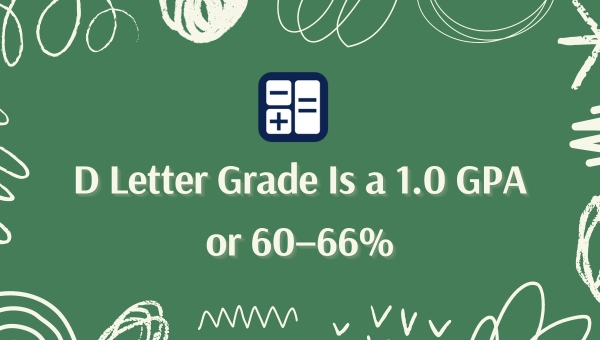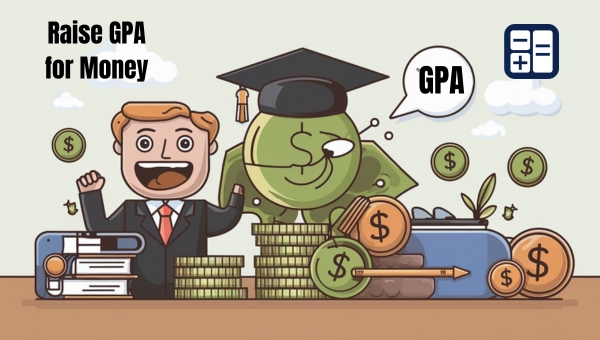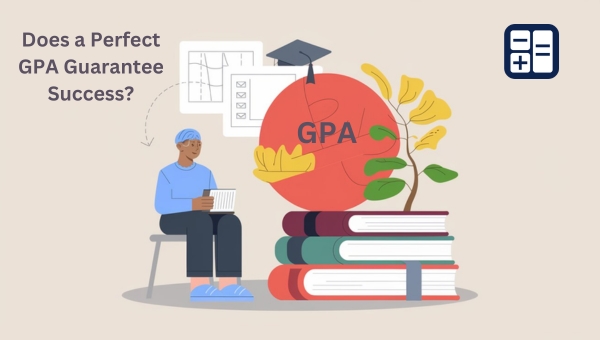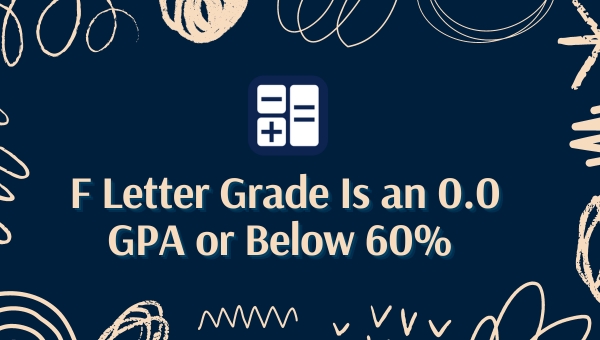D Letter Grade Is a 1.0 GPA or 60–66%

When you see a D letter grade on your report card, it typically translates to a 1.0 GPA or a performance level between 60-66%. This isn’t just a number; it’s a signal that you’re barely meeting the academic requirements.
Such a GPA can limit your options for competitive colleges and future career opportunities. However, it’s crucial to understand what this grade really means and how it impacts your high school experience.
Curious about what steps you can take to improve this situation? Let’s explore proven strategies to boost your GPA and open more doors for your future.
What is a D GPA?
A D GPA typically signifies that the student’s grade point average is hovering just above failing. It’s an indication that while you’re passing, there’s significant room for improvement.
Usually, a D GPA translates to a numerical value of around 1.0 on a 4.0 scale. This means you’re getting grades in the range of 60-66%.
When you have a D GPA, it reflects that you’re meeting the minimum requirements to pass your courses, but you’re not grasping the material as well as you could be. It can be a wake-up call to reassess your study habits, seek additional help, or even consider tutoring.
It’s important to understand that a D GPA can limit your opportunities. Many colleges, universities, and potential employers look at your GPA as a measure of your commitment and ability to understand and apply knowledge.
Having a D GPA suggests that you might struggle with more challenging coursework or job responsibilities.
The good news is that a D GPA isn’t the end of the road. With effort, improved study strategies, and perhaps some guidance, you can raise your GPA and open up more opportunities for your future.
What does a D GPA mean for high school students?
A D GPA can significantly impact your college options, narrowing your choices to primarily safety schools.
Target schools may become out of reach, and dream schools could seem almost impossible to attain.
It’s crucial to understand how this GPA affects your application strategy and what steps you can take to improve your chances.
Safety Schools
Securing a spot in college can feel like an uphill battle, especially if you’re dealing with a D GPA. But don’t lose hope—there are still paths you can take to further your education.
Safety schools can be a key part of your strategy. These are colleges where your academic record meets or exceeds the admissions requirements, giving you a higher chance of acceptance.
When looking for safety schools, consider the following:
- Local Community Colleges: They often have open admissions policies, making them a viable option for students with lower GPAs.
- Trade or Vocational Schools: These institutions focus more on hands-on skills and less on academic performance, offering programs in areas like healthcare, technology, and automotive repair.
- Less Competitive Four-Year Universities: Some universities have more lenient admission criteria and might be willing to overlook a lower GPA if you demonstrate potential in other areas, such as extracurricular activities or personal statements.
Target Schools
Navigating the college admissions process with a D GPA can seem daunting, but don’t let it discourage you. While a D average is lower than the typical admission standards for many institutions, it doesn’t mean your dream of higher education is over. You can still find a target school that fits your academic profile and helps you achieve your goals.
First, you need to identify colleges that accept students with lower GPAs. These schools often look beyond just grades and consider other factors such as:
- Personal statements and essays: Share your story, challenges, and how you’ve grown.
- Extracurricular activities: Highlight your involvement in clubs, sports, or community service.
- Letters of recommendation: Obtain strong endorsements from teachers or mentors who can vouch for your potential and character.
These components can play a significant role in the admissions process, giving you an edge even if your GPA isn’t stellar.
Additionally, some colleges offer conditional acceptance programs or academic support services to help students improve their grades once admitted.
Dream Schools
Despite the challenges of finding target schools, you might still be dreaming of attending a prestigious institution. A D GPA, which translates to a 1.0 or 60-66%, can complicate these dreams but doesn’t make them impossible.
It’s crucial to understand how this GPA can impact your chances and what steps you can take to improve your academic standing.
First, a D GPA means you’re below the average accepted by most dream schools. Prestigious institutions typically look for higher academic performance.
But don’t lose hope—admissions aren’t solely based on grades. Consider these actionable steps:
- Improve your GPA: Focus on raising your grades in current and future classes. Seek extra help, such as tutoring or study groups.
- Excel in other areas: Showcase your strengths in extracurricular activities, leadership roles, and community service to offset the lower GPA.
- Craft a compelling personal statement: Use your application essay to explain any extenuating circumstances that may have impacted your grades and highlight your determination and growth.
Proven Tips to Get a D GPA
To raise your GPA to a D, focus on studying consistently every day and utilizing academic resources available to you.
Make sure to attend all class sessions and communicate with your instructors regularly for extra guidance.
Practicing effective time management will also help you stay on track and improve your grades.
Study Consistently Every Day
Studying consistently every day can significantly impact your GPA, even if your goal is just to achieve a D. By dedicating a small portion of your day to studying, you can better retain information and understand the material. It’s all about creating a habit that becomes second nature.
Start by setting aside 30 minutes to an hour each day for focused study time. This daily commitment helps you stay on top of assignments and prevents last-minute cramming, which often leads to lower grades. Break down your study sessions into manageable chunks to avoid feeling overwhelmed.
Keep your study area organized and free from distractions. A clean, quiet space can improve your concentration and efficiency. Use tools like planners or apps to track your progress and ensure you’re covering all necessary topics.
During your study sessions, focus on understanding key concepts rather than memorizing details. This approach will help you grasp the material more effectively and make it easier to recall during exams.
Reviewing your notes regularly and practicing problems can reinforce your learning.
Utilize Academic Resources Available
Taking advantage of the academic resources available can make a significant difference in achieving your goal of getting a D GPA. First, make use of tutoring services.
Many schools offer free tutoring sessions where you can get help on difficult subjects. Don’t be afraid to ask questions and seek clarification on topics you find challenging.
Next, visit your school’s library. Libraries often have study guides, past exams, and other resources that can help you understand course material better. Plus, the quiet environment can improve your focus and concentration.
Online resources are another great tool. Websites like Khan Academy, Coursera, and YouTube offer free lessons on a wide range of subjects. These platforms can provide alternate explanations and examples that might resonate with you more than your textbook or classroom lectures.
Office hours are an underutilized gem. Professors and teaching assistants hold these sessions specifically to help students. Drop by to discuss your struggles and get personalized advice.
Lastly, form or join a study group. Collaborating with peers can offer new perspectives and study techniques. Sometimes, explaining concepts to others can reinforce your own understanding.
Attend All Class Sessions
While utilizing academic resources can certainly aid in your quest for a D GPA, another key strategy is to attend all your class sessions. Showing up to class consistently can make a significant difference in your understanding of course material, even if your goal is just to pass. By being present, you’ll hear lectures and discussions that highlight key points, which can be crucial for exams and assignments.
Attending class also means you’ll receive firsthand information about any changes in the syllabus, upcoming tests, or assignment deadlines. Professors often provide tips and insights during lectures that aren’t available in textbooks or online resources. Missing out on these could cost you valuable points.
Moreover, being in class allows you to engage in group activities and discussions that can clarify confusing topics. Interaction with classmates can also offer different perspectives and study methods that might resonate with you better.
Plus, some professors grade based on participation, and merely being there can earn you those extra points.
Communicate With Instructors Regularly
To boost your chances of getting a D GPA, regularly communicating with your instructors can make a substantial difference. This proactive approach helps you stay informed about your progress and clarifies any misunderstandings about course material.
Make it a habit to attend office hours or schedule appointments when you need guidance. Don’t hesitate to ask questions about assignments, exams, or any concepts you find challenging.
Regular communication shows your instructors you’re making an effort, which can sometimes lead to leniency in grading or extra help. Email them if you’re unable to meet in person, and be clear and concise in your messages.
Mention specific issues or topics you’re struggling with, and request feedback on how to improve. This targeted approach not only helps you grasp difficult subjects but also demonstrates your commitment.
Practice Effective Time Management
Mastering effective time management can be a game-changer in achieving a D GPA. You need to prioritize tasks that directly impact your grades. Start by creating a weekly schedule. Include study time, class hours, and breaks. Stick to this schedule religiously.
It’s easy to let distractions derail your plans, so minimize them by setting specific times for social media, TV, or hanging out with friends.
Break down your assignments into manageable chunks. Don’t tackle everything at once. Instead, set small, achievable goals each day. This approach prevents last-minute cramming and reduces stress.
Use a planner or digital calendar to keep track of deadlines and important dates. Set reminders to ensure you don’t miss anything critical.
Make sure you allocate time for review sessions before exams. Consistent, short study periods are more effective than marathon study sessions. Use tools like flashcards, summaries, and practice tests to reinforce your learning.
Lastly, don’t overlook self-care. Adequate sleep, healthy eating, and regular exercise can boost your focus and productivity.
How to Raise Your GPA Fast?
Raising your GPA quickly requires a strategic approach and dedication. First, assess your current situation. Identify the classes where you’re struggling and focus on improving in those areas. Utilize resources like tutoring centers, study groups, and online platforms to get help.
Next, communicate with your instructors. Don’t hesitate to ask questions or seek clarifications on topics you find challenging. Building a good rapport with your teachers can also open doors for extra credit opportunities and personalized advice.
Time management is crucial. Prioritize your tasks and create a study schedule. Allocate more time to subjects where you need improvement. Break your study sessions into manageable chunks to avoid burnout.
Active participation in class can also boost your performance. Engage in discussions, answer questions, and take thorough notes. This not only helps with retention but also shows your commitment to the subject.
Lastly, consider retaking courses where you received low grades. Many institutions allow grade replacement, which can significantly impact your GPA.
Stay persistent and remember that raising your GPA is a gradual process. By staying focused and using these strategies, you’ll see improvement in no time.
Conclusion
Raising a D GPA requires effort, but it’s doable. By understanding what a D GPA means and following proven tips to improve, you’ll open doors to better educational and career opportunities.
Don’t get discouraged; instead, focus on effective study habits, seek help when needed, and stay committed. Improving your GPA will not only boost your academic standing but also enhance your future prospects. Keep pushing forward, and you’ll see the results.




